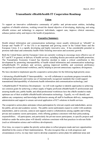
Health related information and communication technology (most usually referenced as "eHealth" in Europe and "Health IT" in the US) is an important and growing sector in the United States and the European Union. It is a rapidly developing and highly innovative area. It has considerable potential to promote individual and community health while fostering innovation and economic growth.
Both the United States and the European Union are currently working to encourage more effective use of ICT and ICT in general, in delivery of health services, including disease prevention and health promotion. The Transatlantic Economic Council has therefore decided to make a critical contribution to this development by promoting interoperability of health related information and communication technology (eHealth/Health IT) products and services, gaining improved mobility and consistent proficiency recognition for a professional workforce, and by helping to prevent unnecessary regulatory divergences.
Download: Transatlantic eHealth/Health IT Cooperation Roadmap (.pdf, 277 KB).
Download from eHealthNews.eu Portal's mirror: Transatlantic eHealth/Health IT Cooperation Roadmap (.pdf, 277 KB).